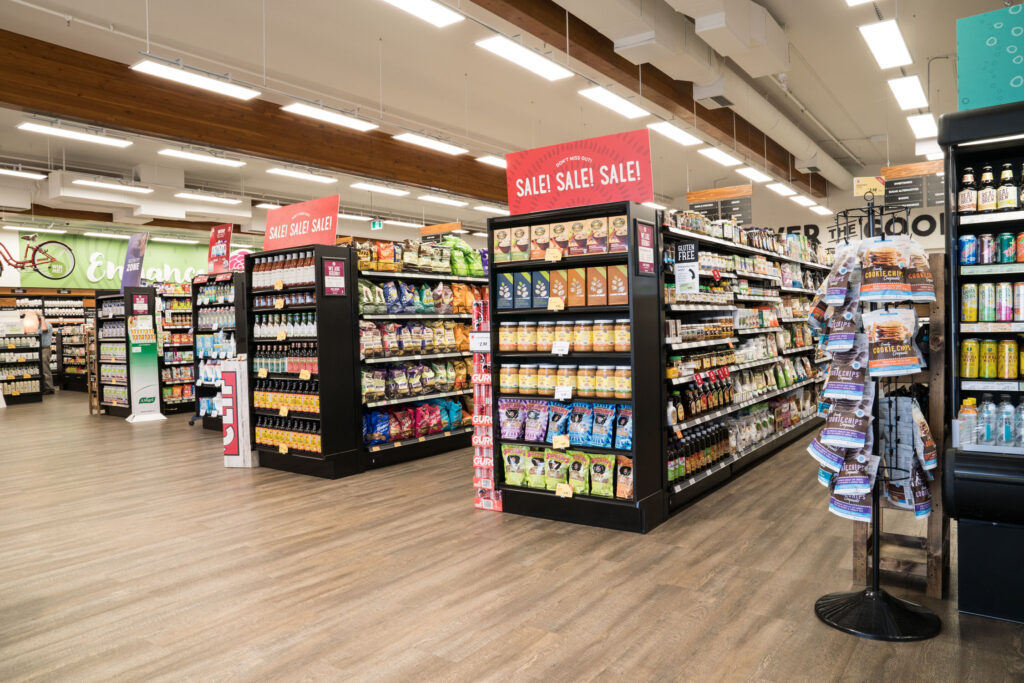Advertisement
Your Natural Health Retailer
So much more than a store

We typically greet September by running frantically from store to store, getting the kids ready for their new school year and settling into a new groove.
If your local health food retailer isn’t one of your September destinations, you’re missing out. For our children and ourselves, natural health retailers offer a wealth of products, resources, education, and encouragement.
Advertisement
Where it all began
Here in North America, we can credit the counterculture movements of the 1960s and 1970s with kindling the natural health industry. These health enthusiasts were some of the first to celebrate food co-ops, healthy eating, vegetarianism, and sustainability.
Fast forward to today, when organics are big business, and specialty natural health retailers remain the cornerstone of complementary health for many reasons.
Advertisement
An exceptional shopping experience
When I worked at a natural health retailer, I was told several times a week by surprised customers how wonderful the store smelled. Although it seems strange, I knew exactly what they were talking about.
Walking into a natural health store is a completely different experience than walking into a conventional grocery store or supermarket. Instead of harsh fluorescent lighting and obnoxious advertising, we’re typically transported into a calming health oasis where the sights, sounds, and even scents are inviting and natural. Whether it’s a large health chain or a small, independent store, the vibe is calmer, happier, and, well, healthier.
Oh, Canada!
Gone are the days when health food was a niche market. Today, Canada is the fourth largest market for organics in the world, contributing $3.5 billion every year to our economy, according to the Canadian Health Food Association. Are you one of the 20 million Canadians who buy organic products?
One-stop shopping
There’s no need to confuse small with inadequate. Natural health retailers of all sizes boast many departments, including
- organic produce
- bread and baked goods
- deli and premade food, or juice/smoothie/coffee bars
- dairy and meat (with organic, free-range, local, and grass-fed options)
- dry goods and groceries (including gourmet and artisanal goodies)
- bulk goods (ask to bring your own container for extra savings or good karma)
- supplements (also known as natural health products or NHPs)
- beauty, hair, and skin care products
- eco-friendly home products and natural cleaning supplies
- fitness and yoga products
- gifts, books, and greeting cards
- pet food and supplies
- floral departments (look for local and Fair Trade options)
Full-service shopping
And just like a mainstream store, many natural health retailers offer all the bells and whistles we’ve come to expect, including
- coupons, flyers, sales, and newsletters
- loyalty and reward programs
- samples and demos
- weekend and extended hours
- product guarantees and return policies
- gift certificates
79%
An alive Listens poll revealed that at least 79 percent of respondents look to their natural health store employees for advice on product knowledge and for personal recommendations.
Advertisement
Unique in every way
While many mainstream stores do stock organics and natural supplements, they typically do so without the same specialization, knowledge, and exceptional customer service that comes from a trip to a natural health retailer.
According to the owner of one popular, longstanding natural health retailer, stores like his “represent hope and escape from ‘Big Pharma’ and possibilities back to health with supplements, service, understanding, and good advice.”
Simply put, when we shop at natural health retailers, we’re supporting the pillars of preventive health in Canada.
Specialization
No matter the category, natural health retailers provide customers with a breadth of selection not found anywhere else. Certain brands pride themselves on being stocked only at natural health retailers, rather than big-box conventional stores. And when it comes to certain food categories, such as gluten-free and vegetarian choices, many conventional retailers may not have the space or clientele to support a large selection.
Compared to some products for sale online, those sold in Canadian natural health retailers are approved for sale as effective and high quality (see sidebar “What is ‘NPN’?”). “Nowadays with online shopping, I think it’s more important than ever to have reliable natural health retailers,” explains one longtime manager of a successful independent natural health retailer.
“People need to know what they’re taking! For example, if someone is buying a cheap, low-grade herb off the internet and they don’t get any relief by taking it, they will start to believe that herbs are ineffective. On the other hand, if they go to a health food store and purchase a high-quality herbal remedy, they’ll see why that herb has safely and effectively been used for centuries.”
What is “NPN”?
The term “NPN” refers to a natural health product’s “natural product number.” When we see a NPN on a product label, it means that Health Canada has assessed the product to ensure it is safe, effective, and of high quality. It’s a strict system, but one that we should be proud of, because it was created to protect the health of us Canadians.
On their labels, products with NPNs must also include information such as a complete list of medicinal and non-medicinal ingredients, recommended use, any cautionary statements or contraindications, and any special storage conditions.
We can even look up more information about a brand, product, or ingredient on the Government of Canada’s website (health-products.canada.ca/lnhpd-bdpsnh/index-eng.jsp).

Why choose organic?
There are myriad reasons to choose organic products. When we support organics, we reduce the use of toxic chemicals that can be harmful for human health, as well as the environment.
- Avoid genetically modified products and ingredients.
- Support animal welfare and humane livestock practices.
- Reduce our carbon footprint, as organic farming uses less energy.
- Protect soil quality, a clean water supply, and biodiversity.
Expert staff
Knowledge is power. This couldn’t be more accurate than when it comes to health information.
Educating us
Many retailers employ staff members who are trained in nutrition, herbalism, naturopathy, aromatherapy, holistic healing, homeopathy, and/or sports and fitness. As a result, consumers can have in-depth conversations with expert staff who can speak to the quality of products and label integrity, specialty diets and recipes, and health conditions.
They can give tailored product recommendations, refer customers to further natural health specialists, and may even bring in special orders if they don’t typically carry a certain product.
According to the natural health retailer manager we spoke to, “I think what sets health food stores apart from big box/conventional stores is the product knowledge provided. Consumers generally have questions about NHPs (as they should), and they want to know more about the product before they add it to their daily regimen.”
In a mainstream big-box retailer, she adds, “you’d be hard pressed to find someone to point you in the general direction of a specific product, let alone take the time to explain how it works, assuming they know anything about it in the first place.”
In addition to offering advice, natural health retailers support customer education and empowerment through
- providing publications free to customers, such as alive magazine, literature on health conditions and products, and recipes
- hosting educational sessions, seminars, and lectures with leading health experts
- bringing in guest specialists for one-on-one consultations
Educating themselves
Similarly, retail owners and managers invest in their staff because they know how important proper training is. In addition to providing training seminars (to stay up-to-date with the latest products, cutting-edge innovation, and trends) and sending staff to educational trade shows, they often support staff in further education.
The alive Academy Nutritional Consulting program and the alive Academy Natural Product Advisor course are perfect examples of this education, as graduates are well-equipped to answer questions about products, ingredients, and health concerns.
Did you know?
An impressive 73 percent of Canadians regularly take some sort of natural health product, such as multivitamins or minerals, herbs, homeopathic products, probiotics, and fish oils. There are currently more than 43,000 of these natural health products on Canadian store shelves.
 Brilliant B Corps
Brilliant B Corps
Some natural health retailers have gone as far as becoming certified B Corp organizations. Going beyond the bottom line, B Corps meet “strict standards of social and environmental performance, accountability, and transparency.” It’s all about using businesses as a force for good in the world.
Businesses must sign a “Declaration of Interdependence,” recognizing the impact that companies’ decisions have on the world, as well as on future generations. They must also prove that they practise what they preach, with such methods as assessment reviews, documentation, background checks, and site reviews.
To learn more about B Corps, visit bcorporation.net.
62%
An alive Listens poll revealed that at least 62 percent of respondents would participate in events, such as cooking classes, workshops, or product seminars, sponsored by their local natural health store.
Community love
Just as the natural food co-ops of the 1960s and 1970s were integral to their communities, many natural health retailers of today are deeply invested in their communities.
This community integration is seen through fundraising efforts, supporting community events, donating to charitable causes, and hosting special days and celebrations. Taking this a step further are some retailers who have become B Corp organizations (see sidebar “Brilliant B Corps” on page 25).
As described by the natural health retailer owner we spoke to, “Our store is community orientated, with educated staff. We sponsor community events, with strong outreach and referrals into the community.” In a wider sense, he explains that “the health food industry should be proud of [its] role in the community … The dedication the leaders in this industry have is to be congratulated—it is not all about money, but health, healing, compassion, and giving back.”
Similarly, the natural health retailer manager explains, “Health food retailers, in my opinion, are the last true customer service-oriented stores. We’re in this business for more than money—we’re here to help people. Sometimes that means recommending a certain product, other times it means lending a sympathetic ear.”
It seems that empowering people to lead healthy lifestyles and become advocates for their wellness goals goes hand in hand with supporting one’s neighbourhood and fostering a strong community connection.
Advertisement
Visit today!
Not sure where your closest natural health retailer is? Use the “Find a Retailer” tool on alive.com: simply plug in your location and discover hidden gems near you.
Happy shopping—and learning!





